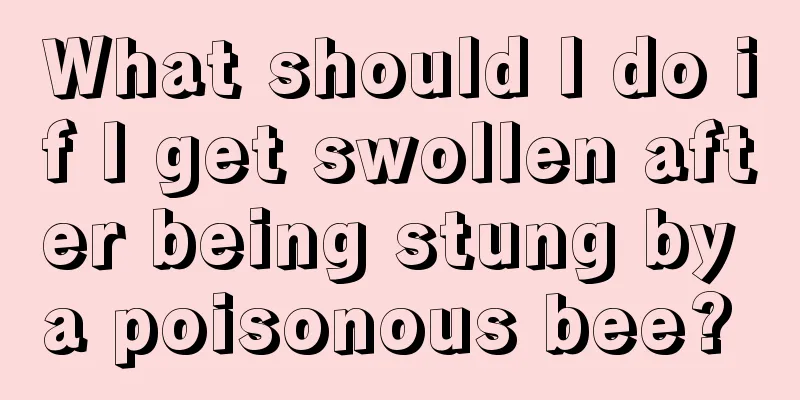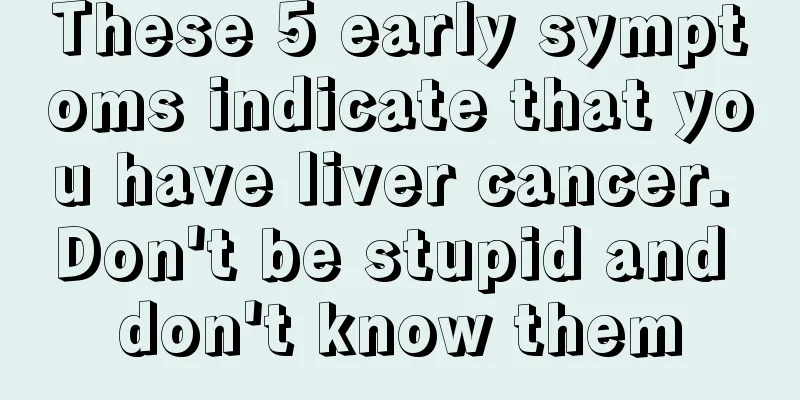What should I do if I get swollen after being stung by a poisonous bee?

|
Being stung by a bee is a very common phenomenon, especially during the blooming season every year. Everyone must be careful when going out. If you are unfortunately stung by a poisonous bee and swollen, the venom of poisonous bees is generally quite toxic. Local pain will occur after being stung. Generally, anti-allergic ointment can be applied. If the symptoms are severe, it is best to seek medical attention as soon as possible, because severe cases may cause vomiting, dizziness, and even shock. What should I do if I get swollen after being stung by a poisonous bee? A mild sting only takes three steps Remove the bee sting After being accidentally stung by a wasp, be sure to carefully check the wound. If the wasp stinger still remains on the skin, you can pick it out with a needle or tweezers, but do not squeeze it to avoid the toxin entering the body. Scrub the wound Because the venom of hornets is weakly alkaline, it is necessary to rinse it with an acidic solution, such as vinegar or 1% acetic acid to scrub the stung area. In addition, there is a folk remedy of using urine to flush the wounds of wasp stings. Because human urine is weakly acidic under normal circumstances, it has a certain effect and can be used in emergency situations. Ice compress After completing the above two steps, you can apply ice to the sting to reduce pain and swelling. If the pain is more severe, you can take some painkillers. Moderate stings, or mild stings where the venom tends to spread After a moderate sting, you can immediately squeeze the stung area with your hands to squeeze out as much venom as possible to greatly reduce redness, swelling and allergic reactions, or wash the stung area with a weak acidic liquid to neutralize the alkalinity of the bee venom, reduce its toxicity, and also have a pain-relieving effect. If you have onions, you can wash them, slice them and apply them to the wound. In addition, you can also use breast milk, wind oil, cooling oil, etc. to remove bee venom. (Do not use mercurochrome or iodine to apply, as this will increase the redness and swelling of the wound) Severe stings, emergency treatment If you develop fever, headache, vomiting, abdominal pain, diarrhea, or difficulty breathing, rough breathing, or wheezing after being stung, you should go to the hospital immediately. On the way to the hospital, you can tie a tourniquet near the wound and loosen it every 15 minutes (the ligation time should not exceed 2 hours). |
<<: What are the benefits of fumigating a room with mugwort leaves
Recommend
Peeling of palms
Every spring and autumn, some friends' palms ...
Experts analyze the symptoms of early esophageal cancer
Everyone has heard of esophageal cancer. But how ...
How often should you sweat steam in summer?
Many people have the habit of doing sweat steamin...
How to prevent vascular headaches, three tips to teach you
Vascular headaches are short-lived and painful, w...
How often should cervical cancer screening be performed
For women over 65, cervical cancer screening can ...
What are the early symptoms of axillary lymphoma and what should you pay attention to in your diet?
What are the early symptoms of axillary lymphoma?...
What are the specialized hospitals for skin cancer
In our country, the high incidence of skin cancer...
Why do you have to change toothpaste
Because toothpaste has different ingredients, its...
How much is the treatment cost for endometrial cancer
I believe many female friends are familiar with t...
How much does chemotherapy for uterine carcinoma sarcoma cost
The cost of chemotherapy for uterine cancer sarco...
Refined grains are a potential risk for kidney cancer
In daily life, the diet is often divided into car...
Key points for postoperative care of patients with esophageal cancer
Postoperative care for esophageal cancer patients...
What role does the balance of bacteria in the stomach play?
People with healthy stomachs do not have no bacte...
Risk factors for colorectal cancer
Intestinal cancer is a common tumor disease that ...
How long should crabs be steamed
Crab is a very common seafood with extremely high...









